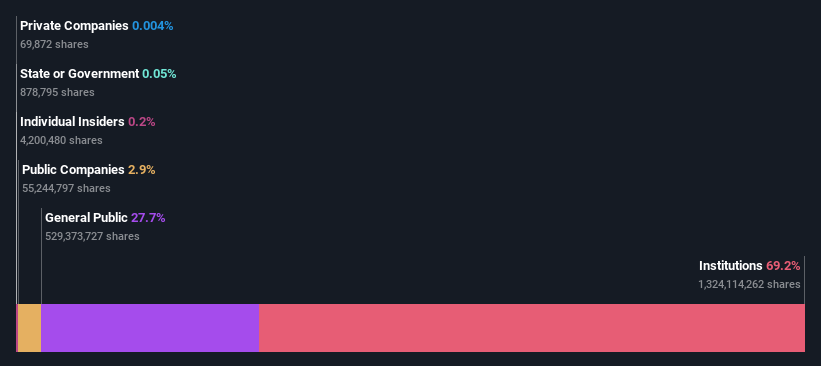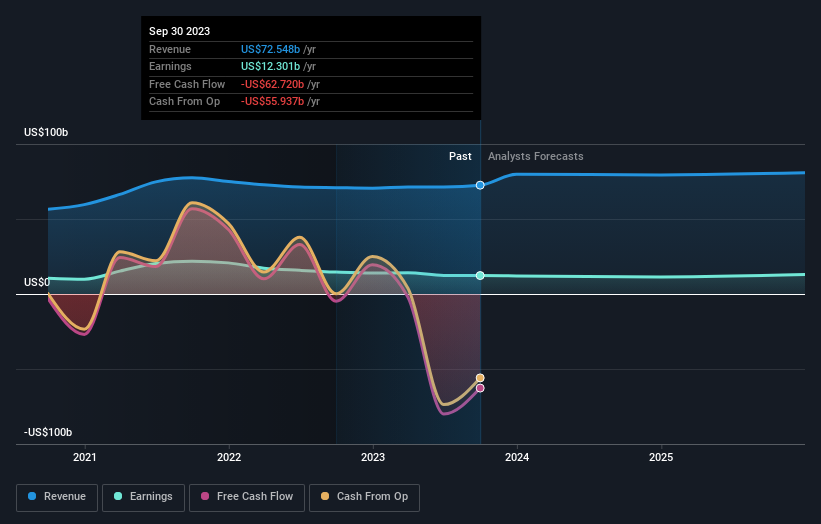After losing 3.1% in the past year, Citigroup Inc. (NYSE:C) institutional owners must be relieved by the recent gain
Key Insights
Institutions' substantial holdings in Citigroup implies that they have significant influence over the company's share price
43% of the business is held by the top 25 shareholders
A look at the shareholders of Citigroup Inc. (NYSE:C) can tell us which group is most powerful. The group holding the most number of shares in the company, around 69% to be precise, is institutions. Put another way, the group faces the maximum upside potential (or downside risk).
Last week's US$4.9b market cap gain would probably be appreciated by institutional investors, especially after a year of 3.1% losses.
Let's take a closer look to see what the different types of shareholders can tell us about Citigroup.
Check out our latest analysis for Citigroup
What Does The Institutional Ownership Tell Us About Citigroup?
Institutions typically measure themselves against a benchmark when reporting to their own investors, so they often become more enthusiastic about a stock once it's included in a major index. We would expect most companies to have some institutions on the register, especially if they are growing.
As you can see, institutional investors have a fair amount of stake in Citigroup. This implies the analysts working for those institutions have looked at the stock and they like it. But just like anyone else, they could be wrong. When multiple institutions own a stock, there's always a risk that they are in a 'crowded trade'. When such a trade goes wrong, multiple parties may compete to sell stock fast. This risk is higher in a company without a history of growth. You can see Citigroup's historic earnings and revenue below, but keep in mind there's always more to the story.
Institutional investors own over 50% of the company, so together than can probably strongly influence board decisions. Citigroup is not owned by hedge funds. The Vanguard Group, Inc. is currently the company's largest shareholder with 8.7% of shares outstanding. BlackRock, Inc. is the second largest shareholder owning 8.6% of common stock, and State Street Global Advisors, Inc. holds about 4.2% of the company stock.
On studying our ownership data, we found that 25 of the top shareholders collectively own less than 50% of the share register, implying that no single individual has a majority interest.
While it makes sense to study institutional ownership data for a company, it also makes sense to study analyst sentiments to know which way the wind is blowing. Quite a few analysts cover the stock, so you could look into forecast growth quite easily.
Insider Ownership Of Citigroup
While the precise definition of an insider can be subjective, almost everyone considers board members to be insiders. Company management run the business, but the CEO will answer to the board, even if he or she is a member of it.
I generally consider insider ownership to be a good thing. However, on some occasions it makes it more difficult for other shareholders to hold the board accountable for decisions.
Our data suggests that insiders own under 1% of Citigroup Inc. in their own names. Being so large, we would not expect insiders to own a large proportion of the stock. Collectively, they own US$191m of stock. It is good to see board members owning shares, but it might be worth checking if those insiders have been buying.
General Public Ownership
The general public-- including retail investors -- own 28% stake in the company, and hence can't easily be ignored. While this group can't necessarily call the shots, it can certainly have a real influence on how the company is run.
Next Steps:
While it is well worth considering the different groups that own a company, there are other factors that are even more important. Consider risks, for instance. Every company has them, and we've spotted 1 warning sign for Citigroup you should know about.
If you are like me, you may want to think about whether this company will grow or shrink. Luckily, you can check this free report showing analyst forecasts for its future.
NB: Figures in this article are calculated using data from the last twelve months, which refer to the 12-month period ending on the last date of the month the financial statement is dated. This may not be consistent with full year annual report figures.
Have feedback on this article? Concerned about the content? Get in touch with us directly. Alternatively, email editorial-team (at) simplywallst.com.
This article by Simply Wall St is general in nature. We provide commentary based on historical data and analyst forecasts only using an unbiased methodology and our articles are not intended to be financial advice. It does not constitute a recommendation to buy or sell any stock, and does not take account of your objectives, or your financial situation. We aim to bring you long-term focused analysis driven by fundamental data. Note that our analysis may not factor in the latest price-sensitive company announcements or qualitative material. Simply Wall St has no position in any stocks mentioned.

 Yahoo Finance
Yahoo Finance 

